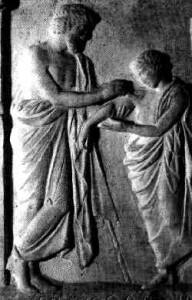Monday, January 12: The Scribbler
ARS LONGA, VITA BREVIS
by James Lincoln Warren
 Today’s title is taken from the Aphorisms of Hippocrates, the 4th century B.C. physician known as the “father of medicine.” The Aphorisms were written in Greek, but this one is best known in its Latin incarnation, so it’s the Latin I’ve opted for here. In English, it is usually translated as “Art is long, but life is short,” which is generally figuratively interpreted to mean “Art is great and eternal, but a human life is small and finite.” The subtext is that to achieve immortality, people must devote themselves to leaving a permanent mark by way of art.
Today’s title is taken from the Aphorisms of Hippocrates, the 4th century B.C. physician known as the “father of medicine.” The Aphorisms were written in Greek, but this one is best known in its Latin incarnation, so it’s the Latin I’ve opted for here. In English, it is usually translated as “Art is long, but life is short,” which is generally figuratively interpreted to mean “Art is great and eternal, but a human life is small and finite.” The subtext is that to achieve immortality, people must devote themselves to leaving a permanent mark by way of art.
This is the classical sentiment alluded to by Woody Allen when he said, “I don’t want to achieve immortality though my work … I want to achieve it through not dying.” Goethe’s Faust invokes it as one of the justifications for selling his soul in exchange for eternal youth.
The interesting thing here, though, is that the common aphorism is actually a truncated version of a longer phrase—and when you read the entire phrase, its meaning changes significantly.
This sort of thing happens all the time. Take “Ignorance is bliss.” Usually, this is taken to mean that somebody is too opaque to recognize the problems actually facing him. But the phrase is a quotation from 18th century poet Thomas Gray’s “Ode on a Distant Prospect of Eton College”. (Yeah, Dick, sorry, but I like good old-fashioned poetry a lot.)
Oscar Wilde had some fun with Gray in “The Importance of Being Ernest” when he has Lady Bracknell declare, “I do not approve of anything that tampers with natural ignorance. Ignorance is like a delicate exotic fruit; touch it and the bloom is gone. The whole theory of modern education is radically unsound. Fortunately in England, at any rate, education produces no effect whatsoever. If it did, it would prove a serious danger to the upper classes, and probably lead to acts of violence in Grosvenor Square.”
Gray, of course, had something else in mind entirely. In the poem, the narrator observes schoolboys at sport, and feels great compassion for them in their state of innocence. They cannot know the many injustices and disappointments that life has in store for them. But he concludes that
But he concludes that
- To each his sufferings: all are men,
Condemned alike to groan;
The tender for another’s pain,
The unfeeling for his own.
Yet ah! why should they know
their fate?
Since sorrow never comes too late,
And happiness too swiftly flies.
Thought would destroy their
paradise.
No more; where ignorance is bliss,
’Tis folly to be wise.
Now, what Hippocrates actually wrote was not only that art is long and life short. The entire aphorism is
“Ars longa, vita brevis, occasio praeceps, experimentum periculosum, iudicium difficile.”
In English: “Art is long; but life is short, opportunity fleeting, experiment treacherous, and judgment difficult.”
It seems to me that the idea that logically follows is: Apply yourself with great industry, because you don’t have much chance in life to accomplish anything worthwhile when you consider all the challenges you must face.
That is a different message than, “Survive though your work.” It’s a much more humanistic sentiment, worthy of the man who pronounced, “First, do no harm.”
But exactly how long is art?
That really depends on whether you’re the artist or the audience. (Also, on how good or bad the art is—there is nothing like having to sit through a bad movie for six hours of torture crammed into ninety minutes.) The other day John observed that fiction has more rules than real life, by which he meant that there are limits on credibility in fiction that reality is not confined by. But there’s more—another of those rules that applies to fiction but not reality is economy in story-telling. Odysseus was away from home for twenty years, but if it took twenty years to read the Odyssey, nobody would bother. Good art depicts life in concentrated form. In a certain sense, then, art is short and life is long.
So it is with short fiction, only more so.
Last week, I said that I felt that the skill sets of a novelist and a short story author were the same, that it was not harder to write in one than the other form. Dick opined, quite correctly, that it was harder to write a 500-word news story than the same story in 1000 words. Louis said that this observation applied to novels and short stories, that a short story was equivalent to the 500-word news story and the novel to the 1000-word version, and therefore short story writing is more skillful than novel writing. This is also true, but only provided that you are talking about two versions of the same story. I wouldn’t use novel length for a story that didn’t call for it, and some stories do. (I actually think that one of my stories, “Miching Malicho”, is too short.) But this is not actually all that relevant when you consider that either way, whatever I write is going to take a lot less time for the Gentle Reader to consume than it took for me to create.
And that’s the job: to provide concentrated slices of experience and existence to the public in the hope that it will, if for only a few brief moments, enrich their lives a little. So while we’re at it, we should apply ourselves with industry, because we don’t have much chance in life to accomplish anything worthwhile when we consider all the challenges we must face.
After all, ars longa, vita brevis.




















Nothing like reading Gray early on a Monday morning to set a cheerful tone for the week ahead. Brings to mind the day of the big bombing at St-Lo that hopefully would lead to a breakout from the Normandy hedgerow country. In the subtle way the Army has of expressing itself we were told, “If anyone wants to write a last letter home, mail will be picked up at oh-nine-hundred hours.”
But okay, I have to agree with all the quotes (especially Wilde) and every word you wrote.
Another familiar quotation that is typically (and distortingly) shortened: “The love of money is the root of all evil.” It’s the love that does it, not the money.
I wonder if what Hippocrates really meant was that art is deep, and life is shallow. Hmm. I’m not going there.
I should emblazon those words over my desk.
There’s another marvelous quote, taken from the Talmud, meant to inspire acts of kindness, but consider the words as a charge to writers:
In other words, get writing.